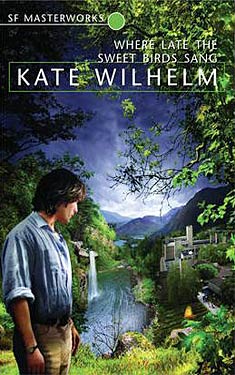WoGF Review: Where Late the Sweet Birds Sang by Kate Wilhelm
 Guest Blogger and WWEnd member, Rob Weber (valashain), reviews science fiction and fantasy books on his blog Val’s Random Comments which we featured in a previous post: Five SF/F Book Blogs Worth Reading. Be sure to visit his site and let him know you found him here.
Guest Blogger and WWEnd member, Rob Weber (valashain), reviews science fiction and fantasy books on his blog Val’s Random Comments which we featured in a previous post: Five SF/F Book Blogs Worth Reading. Be sure to visit his site and let him know you found him here.
 I picked Where Late the Sweet Birds Sang as my third read for the Women of Genre Fiction reading challenge. It’s another one that I’ve head lying around for quite a while. I originally intended to review it late last year but got caught up in moving. Where Late the Sweet Birds Sang is one of Kate Wilhelm‘s most well know works. It won the Locus and Hugo awards and was nominated for a bunch of others, including the Nebula which eventually went to Man Plus by Frederik Pohl. Later on, Wilhelm moved to other genres but in the 1960s and 1970s she produced quite a few science fiction novels. Wilhelm and her second husband Damon Knight, another iconic figure in science fiction, are the founders of the Clarion Workshop, which has become something of an institute in the past decades. The list of participants who went on to become successful authors is impressive.
I picked Where Late the Sweet Birds Sang as my third read for the Women of Genre Fiction reading challenge. It’s another one that I’ve head lying around for quite a while. I originally intended to review it late last year but got caught up in moving. Where Late the Sweet Birds Sang is one of Kate Wilhelm‘s most well know works. It won the Locus and Hugo awards and was nominated for a bunch of others, including the Nebula which eventually went to Man Plus by Frederik Pohl. Later on, Wilhelm moved to other genres but in the 1960s and 1970s she produced quite a few science fiction novels. Wilhelm and her second husband Damon Knight, another iconic figure in science fiction, are the founders of the Clarion Workshop, which has become something of an institute in the past decades. The list of participants who went on to become successful authors is impressive.
Human abuse of the Earth’s ecosystem is finally catching up on mankind. Pollution, radiation and environmental degradation are becoming such huge problems that if affects fertility of just about every plant and animal important to the human food chain.Humanity itself doesn’t escape this tragedy either. Governments pretend it is business as usual, despite the mounting international conflicts over food and other resources. A few people see the end coming however, and set up an isolated community, equipped to survive the end of the world somewhere in a fertile valley in the Eastern USA. Even they are sorely tested when a pandemic breaks out but for the moment the group survives. With sexual reproduction all but impossible, they are doomed to die out however. To ensure humanity’s survival, they resort to cloning themselves in order to create a new generation.



















 Full Details
Full Details

